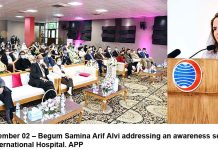ISLAMABAD: The infrastructural and governance level issues needs to be addressed by the governments to streamline the e-learning after Covid19 scenario in ad
dition to efforts
that the learning institutions are putting to be adaptive to new challenges. The top academicians from different national learning institutions and abroad highlighted this while sharing their views with the participants during online dialogue ‘COVID-19 and the challenges to Higher Education in Distance Learning’ organized by the Sustainable Development Policy Institute (SDPI) in collaboration with Allama Iqbal Open University (AIOU), here on Tuesday.
Dr Alastair Creelman, E- Learning Specialist, Linnaeus University Sweden, on the occasion said
that we need to unders
tand that th
ere is a long way to go to overcome the challenges including using and developing the required
tools effectively. He said
that the students and the teachers need necessary skills for effective e learning whereas the issues such as home environment and connectivity also need to be assessed. The production of teaching and learning guides could play critical role in improving the quality of e-learning, he added.
Dr Zia Ul Qayyum, Vice Chancellor, AIOU, was of view
that the focus on finding the ways to respond after Covid19 challenges could lead as to right strategies. He said
that we have enrollment from all parts of Pakistan including remote areas with low and even no connectivity, and respond the needs of students accordingly. He said
that the quality assurance is another critical aspect
that needs our attention and be responded accordingly.
Dr Kam Cheong Li, Open University of Hong Kong, China, while highlighting various
tools that are being applied by his institution in after Covid19 situation, said
that the students and faculty hasn’t been much familiar with online learning mode earlier. However, he said, we have taken a number of initiatives including effective use of various social media tools, helpline desks etc. to bridge the learning gap.
Dr Saima Hamid, Vice Chancellor, Fatima Jinnah Women University, Rawalpindi, Covid19 has accelerated the paradigm shift from the conventional to technological learn9ing. She said
that the universities need to enhance collaboration on new learning techniques and embracing the technological mode of learning is the only way forward. The capacity building sessions for the students and faculty members are proving to be a great help in making this shift effective, she added.
Dr Shafiq ur Rehman, Head of English and E-Learning, Yumbu University College, Saudi Arabia, while sharing his thoughts with the audience, said
that initially the challenge of shifting towards technological based learning was a huge challenge for his institution. However, despite the fact
that our students were not much tech-savvy, we build our capacity of e-learning and it has been proving effective, he concluded.
Dr Imran Khalid of SDPI highlighted the issue of technological exclusion and said
that many of the students lack the connectivity and gadgets He said
that we must take them along while devising our strategies. Mr Shahid Minhas of SDPI, earlier presented an overview of e-learning challenges and opportunities in the after Covid10 scenario.





.jpg)





